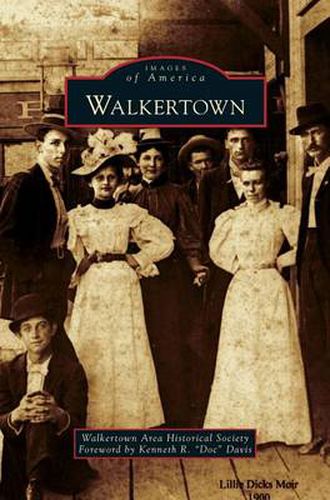Readings Newsletter
Become a Readings Member to make your shopping experience even easier.
Sign in or sign up for free!
You’re not far away from qualifying for FREE standard shipping within Australia
You’ve qualified for FREE standard shipping within Australia
The cart is loading…






This title is printed to order. This book may have been self-published. If so, we cannot guarantee the quality of the content. In the main most books will have gone through the editing process however some may not. We therefore suggest that you be aware of this before ordering this book. If in doubt check either the author or publisher’s details as we are unable to accept any returns unless they are faulty. Please contact us if you have any questions.
European settlers came into the area now known as Walkertown as early as the 1750s. From 1850 through the early 20th century, the local economy was dependent on farming, lumber manufacturing, grain milling, and merchandising. Tobacco manufacturing began
early in the 19th century and became a thriving industry for the Sullivan, Booe, Poindexter, and Crews families. The Roanoke & Southern Railroad began serving Walkertown in 1889, and with it the availability of larger markets spurred the growth of industry. The Leight Lumber Company was established near the depot around 1890 and prospered by making boxes for manufacturers and lumber for construction. The Walkertown Chair Company, begun in 1903, flourished until a devastating fire destroyed most of the buildings in 1940. The Walkertown Roller Mill, built by Robah Payne around 1900, has changed hands a few times and is now the oldest continuously operating business in Walkertown.
$9.00 standard shipping within Australia
FREE standard shipping within Australia for orders over $100.00
Express & International shipping calculated at checkout
This title is printed to order. This book may have been self-published. If so, we cannot guarantee the quality of the content. In the main most books will have gone through the editing process however some may not. We therefore suggest that you be aware of this before ordering this book. If in doubt check either the author or publisher’s details as we are unable to accept any returns unless they are faulty. Please contact us if you have any questions.
European settlers came into the area now known as Walkertown as early as the 1750s. From 1850 through the early 20th century, the local economy was dependent on farming, lumber manufacturing, grain milling, and merchandising. Tobacco manufacturing began
early in the 19th century and became a thriving industry for the Sullivan, Booe, Poindexter, and Crews families. The Roanoke & Southern Railroad began serving Walkertown in 1889, and with it the availability of larger markets spurred the growth of industry. The Leight Lumber Company was established near the depot around 1890 and prospered by making boxes for manufacturers and lumber for construction. The Walkertown Chair Company, begun in 1903, flourished until a devastating fire destroyed most of the buildings in 1940. The Walkertown Roller Mill, built by Robah Payne around 1900, has changed hands a few times and is now the oldest continuously operating business in Walkertown.